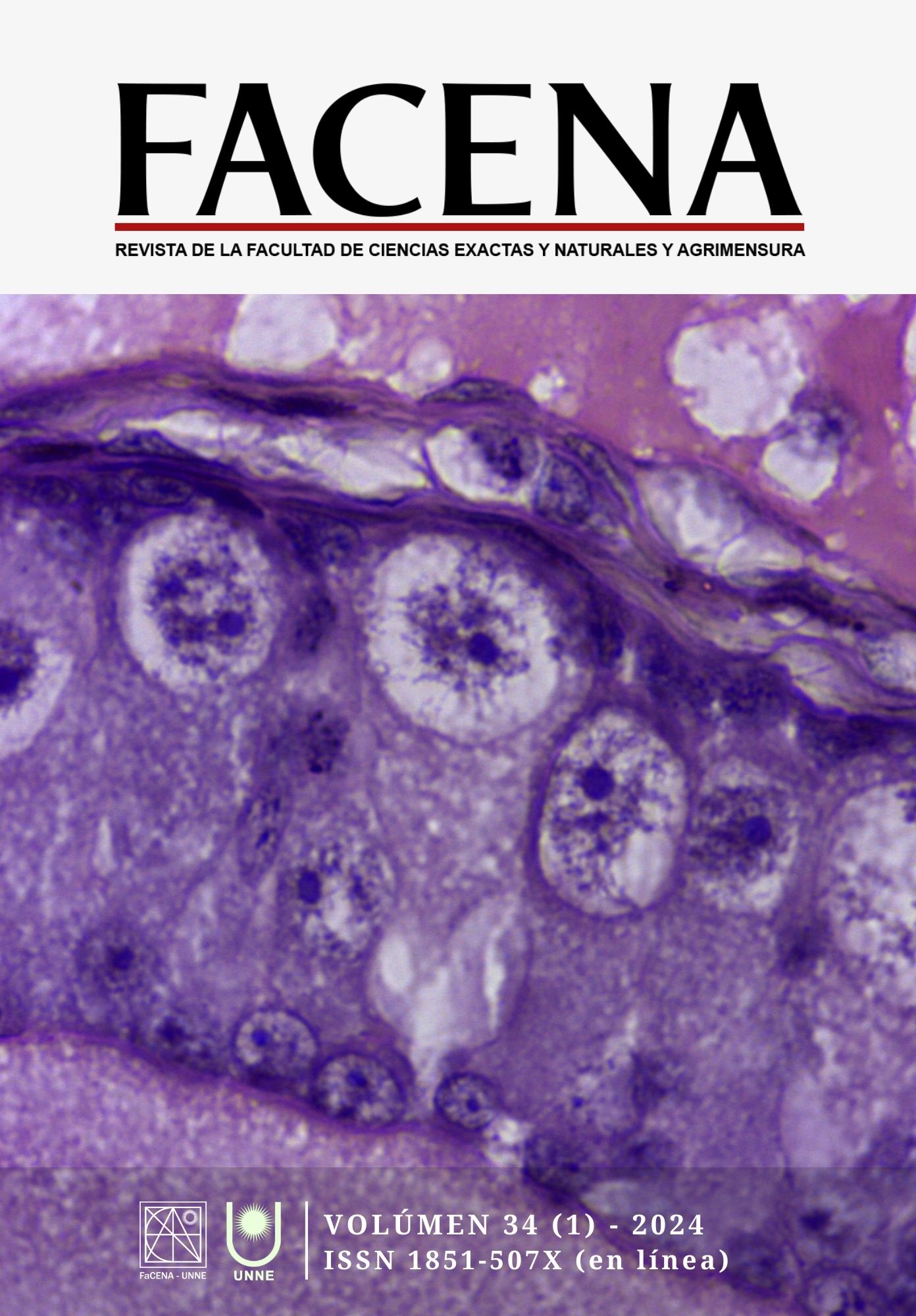Nanomorphology of horny scale of Dipsadinae snakes (Squamata: Colubridae)
DOI:
https://doi.org/10.30972/fac.3417464Keywords:
Morphological adaptations, Dipsadinae, Horny scale, Microstructure, Snake, UltrastructureAbstract
This study focuses on the analysis of the nanostructure of the horny scales in four species of snakes of the subfamily Dipsadinae from Argentina, examining the microscopic characteristics of the surface of the cephalic and body scales by scanning electron microscopy (SEM). The results reveal a configuration of cellular morphotypes in the scale hinge and basal areas common to all scales and species analysed; cellular variability was observed in the apical region of the scales, where different cellular morphotypes were identified in the various taxa. This structural variability, as well as the presence of microornamentations (microtufts, ridges, or raised structures), point to intergeneric microstructural differences that could be related to both phylogenetic and functional factors, specific to each type of scale in response to the environment where the species inhabit.
Downloads
References
Abdel-Aal H.A. 2018. Surface structure and tribology of legless squamate reptiles. Journal of the Mechanical Behavior of Biomedical Materials 79:354–398.
Allam A.A; R.E. Abo-Eleneen. 2012. Scales microstructure of snakes from the Egyptian area. Zool Sci, 29: 770–775
Allam A. A.; R. E. Abo-Eleneen; S. I. Othman. 2017. Microstructure of scales in selected lizard species. Saudi J Biol Sci, 26(1): 129–136.
Arrigo M. I.; L. M. D. O. Vilaca; A. Fofonjka; A. N. Srikanthan; A. Debry; M. C. Milinkovitch. 2019. Phylogenetic mapping of scale nanostructure diversity in snakes. BMC Evolutionary Biology, 19: 91.
Arroyo O.; L. Cerdas. 1985. Microestructura de las escamas dorsales de nueve especies de serpientes costarricenses (Viperidae). Rev. Biol. Trop. Vol. 34 N°.1, p.123-126.
Chiasson R. B. and C. H. Lowe. 1989. Ultrastructural scale patterns in Nerodia and Thamnophis. J Herpetol, 23: 109–118.
Dowling H. G.; I. Gilboa; D. E. Gennaro and J. F. Gennaro. 1972. Microdermatoglyphics: a new tool for reptile taxonomy. Herpetol. Rev, 4:200.
Gans C. and D. Baic. 1977. Regional specialization of reptilian scale surfaces: relation of texture and biologic role. Science 195: 1348–1350.
Gower D.J. 2003. Scale microornamentation of uropeltid snakes. J Morphol, 258: 249–268.
Hernández M.; D. Rada de Martínez. 1992. Contribución al conocimiento del género Mastigodyas (Serpentes, Colubridae) en Venezuela. Acta Biol. Venez. 13(3-4): 67-81.
Hoge A.R. and P. Souza-Santos. 1953. Submicroscopic structure of “stratum corneum” of snakes. Science 118: 410–411.
Hoge A. R and S. A Romano Hoge. 1980. Notes on Micro and ultrastructure of “Oberhaütschen” in Viperoidea. Mem. Inst. Butantan. 44/45: 81-118.
Klein M. C. G. and S. N. Gorb. 2012. Epidermis architecture and material properties of the skin of four snake species. J Royal Soc Interface, 9(76): 3140–3155.
Krey K. and A. Farajallah. 2013. Skin histology and microtopography of Papuan white snake (Micropechis ikaheka) in relation to their zoogeographical distribution. HAYATI Journal of Biosciences, 20(1): 7–14.
Miller B. T.; J.L. Miller; A. Drumwright Newby. 2015. Surface morphology of dorsal scales of Red Cornsnakes (Pantherophis guttatus) and Gray Ratsnakes (Pantherophis spiloides) from Middle Tennessee. Journal of the Tennessee Academy of Science.
Peterson J.A. 1984a. The microstructure of the scale surface in iguanid lizards. J. Herpetol, 18:437- 467.
Peterson J.A. 1984b. The scale microarchitecture of Sphenodon punctatus. J. Herpetol, 18:40- 47.
Peterson J.A. and R. L. Bezy. 1985. The microstructure and evolution of scale surfaces in Xantusiid lizards. Herpetol. Rev, 41: 298- 324.
Picado T. C. 1931. Epidermal microornaments of the Crotalinae. Bull. Antivenin Inst. Amer, 4:104- 105.
Price R. M. 1981. Analysis of the ecological and taxonomic correspondence of dorsal snake scale microdermatoglypics. Ph.D. dissertation, New York University, 164 pp.
Price R. M. 1982. Dorsal snake scale microdermatoglyphics: ecological indicator or taxonomic tool? J Herpetol, 16: 294- 306.
Price R. 1983. Microdermatoglyphics: the Liodytes regina problem. J Herpetol, 17:292.
Price, R.; P. Kelly. 1989. Microdermatoglyphics: basal patterns and transition zones. J Herpetol, 23: 244- 261.
Rada de Martínez D.; M. Hernández. 1999. Contribución al conocimiento del género Leptodeira (Serpentes, Colubridae) in Venezuela. Acta Biol. Venez, 19(3): 11-18.
Rocha-Barbosa O.; R. Moraes-e-Silva. 2009. Analysis of the microstructure of Xenodontinae snake scales associated with different habitat occupation strategies. Braz J Biol, 69: 919- 923.
Ruibal M. 1968. The ultrastructure of the surface of lizard scales. Copeia 1968: 698-704.
Schmidt C. V. and S. N. Gorb. 2012. Snake scale microstructure: phylogenetic significance and functional adaptations. Zoologica, 157:1-106. ISBN 978-3-510- 55044.
Stewart G. R.; R. S. Daniel. 1973. Scanning electron microscopy of scales from different body regions of three lizard species. J Morphol, 139(4): 377- 388.
Stewart G. R.; R. S. Daniel. 1975 Microornamentation of lizard scales: come variations and taxonomic correlations. Herpetological 31: 117- 130.
Tsai T. S.; J. J. Mao; Y. Y. Chan; Y. J. Lee; Z. Y. Fan; and S. H. Wang. 2018. Species Identification of Fragmented or Faded Shed Snake Skins by Light Microscopy. Zoologycal. SCIENCE 35: 330- 352.
Tsai T. S.; S. H. Wang; J. J Mao; Y.Y. Chan; Y. J. Lee; Z.Y. Fan; K. H. Hung; Y. H. Wu; Y. T. and T. E. Lin. 2020. Species Identification of Shed Snake Skins by Scanning Electron Microscopy, with Verification of Intraspecific Variations and Phylogenetic Comparative Analyses of Microdermatoglyphics. Herpetological Monographs, 34, 178- 207.
Wang K.; Y. Zhao; H. U. Chaochao; L. I. Hong; Q.U. Yanfu; J.I. Xiang. 2020. Adaptive Evolution of the Ventral Scale Microornamentations among Three Snake Species. Asian Herpetological Research, 11(4): 365- 372.
Downloads
Published
Versions
- 2024-06-26 (2)
- 2024-05-31 (1)








